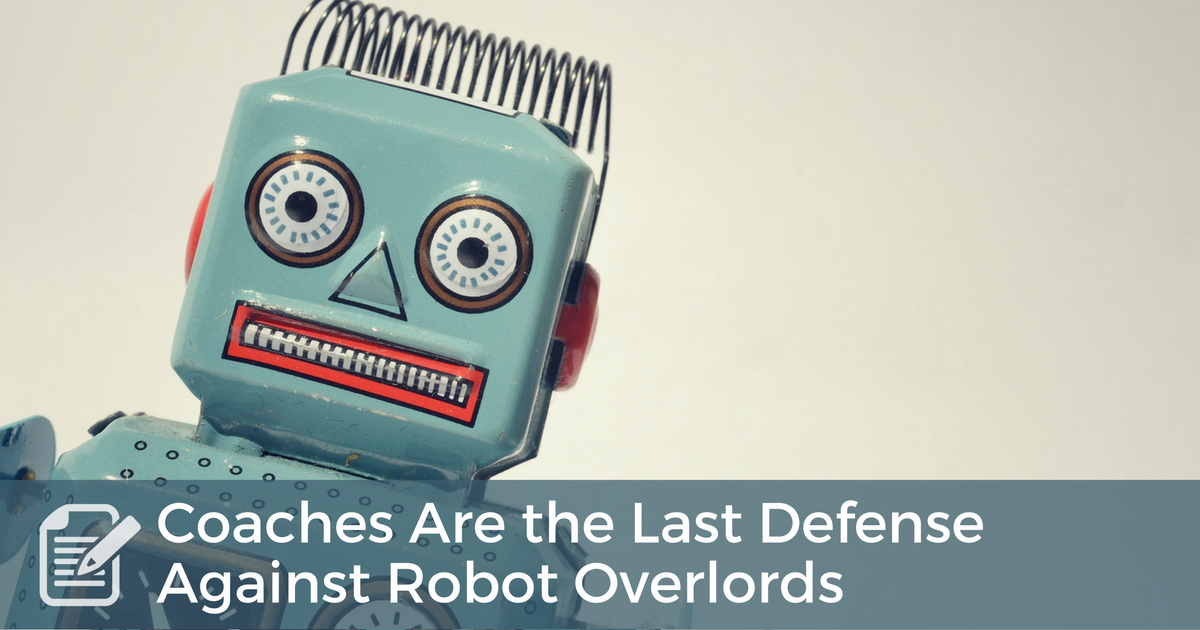
Billionaire tech guru, Elon Musk, founder of Space X, Tesla, and Solar City, describes a frightening scenario about the danger of Artificial Intelligence (AI) in an upcoming documentary by Werner Herzog called “Lo and Behold.”
“If you were a hedge fund or private equity fund and you said, ‘Well, all I want my AI to do is maximize the value of my portfolio,’ then the AI could decide, well, the best way to do that is to short consumer stocks, go long defense stocks, and start a war. That would obviously be quite bad.”
Simplified, Musk can imagine the possibility of an Artificial Intelligence starting a war in hopes of making me a billionaire.
That is a future possibility. Here is a present reality.
Google has an Artificial Intelligence called DeepMind. Unlike other computers, DeepMind isn’t programmed to solve problems. DeepMind learns how to solve problems. For instance, and this will blow your mind, Google wouldn’t program DeepMind to play chess. It wouldn’t even program the rules of chess into DeepMind. Instead, it would show DeepMind a million games of chess, and let DeepMind figure out how to play and win.
You don’t have to teach a kid to play kickball. She will just get in the line and watch, and when it is her turn, she will kick the ball and run counterclockwise around the bases. She learns more by watching than by being taught. Welcome to the reality of Artificial Intelligence.
Google wanted a bigger challenge than chess. Google taught DeepMind to play Go. Go is the oldest board game still played today. The rules are simple but the strategy is considered much more complex than Chess. Instead of teaching DeepMind to play Go, they let DeepMind watch hundreds of games of Go. DeepMind then began to play. As it learned, it got better and better. And it began to win… a lot.
When DeepMind was ready, it played Lee Se-dol, a legendary Go player from Seoul Korea.
“I was very surprised,” said Lee after the match. “I didn’t expect to lose. I didn’t think [DeepMind] would play the game in such a perfect manner.”
How did Deepmind play such a perfect game? We don’t know. We don’t know it’s strategy. It learned from thousands of experiences, just like we learn from thousands of experiences. The difference is that DeepMind can have thousands of experiences in a few minutes because of its access to massive amounts of data. It takes us a lifetime.
In May, Three London hospitals gave DeepMind access to enormous amounts of healthcare data. Dr. Chris Lang, a kidney doctor, approached Google to see if a collaboration was possible.
“The system is crying out for more innovation and hopefully that is something we can pioneer.” – Dr Chris Lang
What will DeepMind learn? What strategy will it propose? We don’t know.
To build on Elon Musk’s scenario, let’s say DeepMind takes those London Hospital records, millions of them, and begins to look for winning patterns. Let’s say a win is defined by reducing costs and extending people’s lives. That seems like a good definition of a win.
As the computer spits out a solution, we have no idea what it is “thinking.” It designed its own algorithm by looking deeper at the data than anyone on earth could possibly digest. DeepMind could learn that racism is the best way to reduce health care costs and extend the lives of the people of London. And we wouldn’t even know. It would just tell us what to do. It wouldn’t tell us why.
Am I suggesting we all get off the grid and separate ourselves from the future of technology? No.
Am I suggesting we start a terror group and blow up DeepMind and all of its future kind? No.
Am I suggesting we lay down our wills and blindly obey our the Artificial Intelligence that will attempt to solve all our problems? No.
AI is coming and will be as widely available to you as central air conditioning. You will be able to personalize it to your health, your business, and even your pleasure. It will be applied to gardening, church planting, cooking, leadership development, choosing a new pastor, and dog grooming.
Instead of thinking less, I propose we begin to think more.
Coaching is the key to thinking more deeply. Coaching is about discovery and motivation and design. Dare I predict that all of the next batch of billionaires will have a coach who helped them think more deeply and more intentionally about how to adapt through the next twenty years of exponential change.
Here are three areas coaches can help people think more deeply.
Think More Deeply About How to Make a Living in the Changing Economy
To this day, my 83-year-old mom won’t use an automated checkout at Wal-Mart because she doesn’t want a cashier to lose her job. There are better ways to help out the former cashiers of the world.
With the coming technologies, thousands of new jobs will develop. Think about how many jobs developed because of the invention of the car.
- Detail shops
- Car washes
- Mechanics
- Dealerships
- Parts stores
- NASCAR
- Tire sales
- Oil Change shops
- Meter maids
- Tow trucks
The list goes on and on. Nobody had any of these jobs before the invention of the car. The invention of Artificial Intelligence will have an even greater impact than the car. Jobs will be eliminated. And jobs will emerge. A coach can help people move quicker through those transitions.
Truck driving jobs will probably all be gone by 2036. So truck drivers will need to be retrained. Rather than waiting to see what they might be trained to do, a truck driver might be in the perfect position to imagine what driverless trucks will need most. A coach could help a truck driver get ahead of the game and possibly make even more money doing it.
At Coach Approach, we tell a legendary story about how one of our founders, Jane Creswell, helped an engineer design a new telecommunications network, while having no expertise in the area. Over the next twenty years, these kinds of stories will be common place, pulling the expertise out of people who didn’t realize they were experts at all.
Think More Deeply About What It Means to Be Human
Artificial Intelligence will never be the expert on what it means to be human. As a Christ-based organization, I think this puts us in a great position to help people think about the heart of humanity. The Bible says “For God so loved the world that He gave His One and Only Son…” The world wants to be tribal. The world wants us to choose sides. Jesus says we are all unified in Him.
Experts in the field of Artificial Intelligence have some real fears that tomorrow’s computers could be sexist or racist or any number of “ists” that would achieve a better end for some, but could hold many others back.
Another trend I see is people who don’t want a coach, rather they want somebody to tell them exactly how to achieve their desired success. This is often a horrible idea. This is why we tend to only plant new churches in America in the wealthiest areas. This is why Sunday morning in America tends to be the most segregated hour of the week. This is why church planters don’t innovate, they copy, and they fail. If you worry about the poor and about race, churches don’t grow as large. Wealthy people don’t want to go to church with poor people. Artificial Intelligence isn’t going to call that a sin. It’s going to call that a win.
Rather than have a separation between the idealist and the practical thinkers, we should have coaches working with both to implement the Gospel in the healthiest way possible. Coaches are a great way to get practical people to think more deeply and to get idealist to make an actionable plan.
Think More Deeply About How to Harness Artificial Intelligence in order to expand the Kingdom of God.
We can join the Amish, or we can harness a great power for the Kingdom of God.
Thomas Watson, president of IBM in 1943, famously said, “I think there is a world market for maybe five computers.”
Artificial Intelligence won’t be one computer owned by Google. AI will be piped into your home, car, phone, and maybe even your body just like cable television. You will pay for it by the month. You won’t be complaining about poor cell reception. You will be complaining about a laggy AI.
The uses for Artificial Intelligence are unlimited. The church has moved herself forward on the back of paved roads, electric lights, the pump organ, the printing press, and now even the internet. We will want to use our best minds to figure out how to harness AI in the next twenty years to benefit the cause of Christ.


